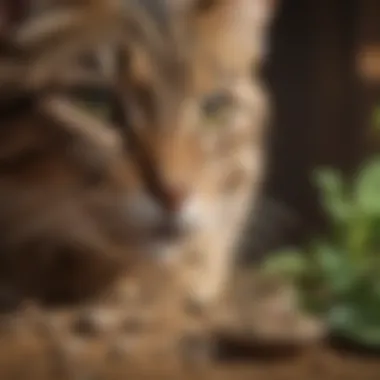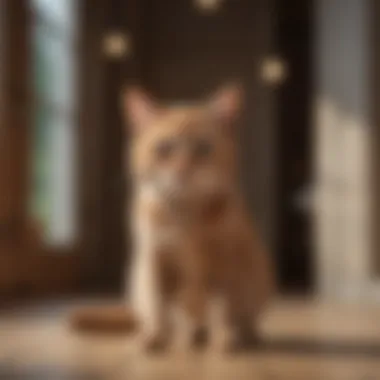Effective Natural Remedies for Constipated Cats to Enhance Feline Health


Pet Health Issues
Recognizing signs of illness, including symptoms of constipation, is crucial for proactive pet care. Monitoring your cat's behavior and bowel habits can reveal underlying health issues, allowing for timely intervention to address constipation and prevent further complications. Implementing preventative care measures, such as regular vet visits and wellness exams, can aid in maintaining your cat's gastrointestinal health and minimizing the risk of constipation.
Understanding common ailments that may affect your cat, such as hairballs or gastrointestinal obstructions, equips you to respond effectively and seek appropriate treatment promptly. Being prepared for emergencies, with knowledge of basic feline first aid and immediate care protocols, can make a significant difference in managing constipation episodes and ensuring your cat's well-being is safeguarded at all times.
Understanding Cat Constipation
Constipation in cats is a common issue that can adversely affect their overall health and well-being. In this article, we delve deep into the intricacies of cat constipation, highlighting the importance of recognizing the signs and symptoms early on. By understanding the underlying factors that contribute to constipation in cats, pet owners can take proactive measures to address and alleviate this discomforting condition. Through a combination of informative insights and practical tips, we aim to empower cat owners to provide the best care possible for their feline companions.
Causes of Cat Constipation
Dehydration
Dehydration plays a pivotal role in causing cat constipation. When cats do not consume an adequate amount of water, their stools can become dry and difficult to pass, leading to constipation. Proper hydration is crucial for maintaining healthy bowel movements in cats. By emphasizing the importance of keeping cats hydrated, pet owners can mitigate the risk of constipation and promote optimal gastrointestinal health.
Dietary Factors
The diet of a cat directly influences its digestive health and can be a significant factor contributing to constipation. A lack of fiber in the diet can lead to ineffective digestion and hard stools, resulting in constipation. By incorporating fiber-rich foods into a cat's diet, pet owners can support proper digestion and prevent constipation. Choosing the right balance of nutrients is essential in promoting regular bowel movements and alleviating constipation in cats.
Obstruction in the Intestines
Obstructions in the intestines can impede the natural flow of stool, causing constipation in cats. Various factors, such as hairballs, foreign objects, or tumors, can obstruct the intestines and disrupt normal bowel movements. Pet owners should be vigilant for signs of intestinal obstructions in their cats, as prompt detection and treatment are crucial in resolving constipation caused by obstructions. Understanding the potential sources of obstruction is key to preventing severe complications in cats.
Symptoms of Cat Constipation
Irregular Bowel Movements
Irregular bowel movements, such as infrequent or strained defecation, are indicative of constipation in cats. Monitoring the frequency and consistency of a cat's bowel movements is essential for early detection of constipation. By being attentive to changes in bowel habits, pet owners can promptly address constipation and prevent further complications. Recognizing the patterns of irregular bowel movements is vital in gauging the severity of constipation in cats.


Straining in the Litter Box
Observing a cat straining in the litter box without producing stool is a clear sign of constipation. Cats may exhibit discomfort or pain while attempting to defecate due to constipation. Pet owners should closely monitor their cat's litter box behavior to identify instances of straining and seek appropriate interventions. Addressing the root cause of straining is imperative in providing relief and improving bowel function in constipated cats.
Changes in Appetite
Changes in a cat's appetite, such as reduced food intake or loss of interest in eating, can be linked to constipation. Digestive discomfort caused by constipation may lead to appetite alterations in cats. Pet owners should be observant of any shifts in their cat's eating behaviors and appetite levels to correlate them with constipation symptoms. Understanding the relationship between appetite changes and constipation aids in implementing targeted remedies and ensuring a cat's nutritional well-being.
Natural Remedies for Cat Constipation
In this section, we delve into the crucial topic of natural remedies for cat constipation. A common issue among feline companions, constipation can be addressed through holistic approaches that promote better gastrointestinal health in cats. By exploring various remedies such as dietary adjustments, physical interventions, herbal remedies, and expert guidance from veterinarians, pet owners can effectively alleviate this condition and enhance their cat's well-being.
Hydration Enhancements
Increasing Water Intake
Boosting a cat's water intake is a fundamental aspect of combating constipation. Adequate hydration helps soften stool, making it easier for cats to pass waste comfortably. By encouraging cats to drink more water through strategies like placing multiple water bowls around the house or investing in a cat fountain, pet owners can significantly improve their cat's digestive health.
Fluid-rich Foods
Incorporating moisture-rich foods into a cat's diet can also aid in hydration. Wet cat food, broths, or adding water to dry food are excellent ways to increase a cat's fluid intake. These options not only provide essential nutrients but also contribute to overall hydration, supporting regular bowel movements and preventing constipation.
Dietary Adjustments
Fiber Supplements
Fiber supplements play a vital role in promoting digestive health for cats. By adding a moderate amount of fiber to a cat's diet, whether through specialized cat food or supplement powders, pet owners can facilitate smoother bowel movements. However, it's crucial to consult a veterinarian before introducing any new dietary supplements to ensure they are suitable for the cat's specific needs.
Probiotics


Introducing probiotics into a cat's diet can help maintain a healthy balance of gut bacteria, improving overall gastrointestinal function. Probiotic supplements or probiotic-rich foods like yogurt can aid in digestion and reduce the risk of constipation. As with any dietary adjustment, monitoring the cat's response to probiotics is essential for determining their effectiveness.
Physical Interventions
Gentle Abdominal Massage
Gentle abdominal massage can stimulate bowel movements in cats experiencing constipation. By using gentle, circular motions on the cat's abdomen, pet owners can help alleviate discomfort and encourage the natural elimination process. It's important to be cautious and gentle during the massage to avoid causing any distress to the cat.
Exercise Encouragement
Encouraging physical activity is another effective way to prevent constipation in cats. Regular exercise helps regulate the digestive system and promotes overall well-being. Interactive toys, play sessions, or creating a stimulating environment can motivate cats to stay active, supporting healthy bowel function.
Herbal Remedies
Psyllium Husk
Psyllium husk is a natural fiber source that can aid in treating constipation in cats. This soluble fiber absorbs water in the digestive tract, softening stool and promoting regular bowel movements. When used in moderation and under veterinary supervision, psyllium husk can be a beneficial addition to a cat's diet.
Pumpkin
Pumpkin is another natural remedy that can help alleviate constipation in cats. Rich in fiber and moisture, canned pumpkin or pureed pumpkin can be mixed into a cat's food to improve digestion and regulate bowel movements. It's essential to choose plain canned pumpkin without added sugars or spices for maximum effectiveness.
Consulting a Veterinarian
Importance of Professional Guidance
Seeking advice from a veterinarian is paramount when dealing with cat constipation. Veterinarians can provide tailored recommendations based on the cat's health status, conduct diagnostic tests if necessary, and offer expert guidance on the most suitable treatment options. Professional oversight ensures that the remedies implemented are safe and effective for the cat's individual needs.
Diagnostic Procedures


In cases of severe or persistent constipation, diagnostic procedures may be required to identify underlying causes. Veterinary examinations, fecal testing, or imaging studies can help pinpoint any obstructions or conditions affecting the cat's gastrointestinal health. These procedures are essential for formulating a targeted treatment plan and ensuring the cat receives appropriate care.
Preventive Measures and Long-term Care
In this segment, we delve into the crucial aspects of Preventive Measures and Long-term Care concerning cat constipation. Preventive Measures play a pivotal role in maintaining feline gastrointestinal health over the long term. By implementing proactive strategies, pet owners can minimize the occurrence of constipation in their beloved cats. Regular monitoring is key to identifying any potential issues early on, thus fostering a proactive approach to cat care. Engaging in Long-term Care practices ensures the overall well-being of cats, promoting optimal health and preventing future complications.
Regular Monitoring
Dietary Observations
Dietary Observations are a fundamental aspect of cat care, particularly when addressing constipation. By keenly observing the cat's dietary habits, pet owners can track food intake patterns and identify any irregularities that might contribute to constipation. Monitoring dietary fiber content and hydration levels is essential for maintaining optimal digestive function in cats. While Dietary Observations require diligence and consistency, they offer valuable insights into the cat's overall health status, enabling timely interventions when required.
Hydration Checks
Hydration Checks are crucial for assessing the cat's fluid intake and hydration status. Dehydration can exacerbate constipation in cats, making regular Hydration Checks imperative for preventive care. By monitoring water consumption and encouraging adequate hydration, pet owners can support optimal kidney function and promote healthy bowel movements. While conducting Hydration Checks may seem simple, their impact on the cat's well-being cannot be overstated, making them a vital component of long-term cat care.
Healthy Lifestyle Promotion
Balanced Diet
A Balanced Diet is a cornerstone of feline health and plays a significant role in preventing constipation. Providing cats with a nutritionally balanced diet rich in fiber and essential nutrients is essential for optimal gastrointestinal function. A Balanced Diet not only supports digestive health but also enhances overall well-being, immune function, and energy levels in cats. While adherence to a Balanced Diet requires commitment, the benefits it offers in promoting gastrointestinal regularity and preventing constipation are substantial.
Physical Activity
Physical Activity is instrumental in maintaining a cat's overall health and well-being, including gastrointestinal function. Encouraging regular exercise helps prevent obesity, which is a risk factor for constipation. Physical Activity stimulates bowel motility, promoting regular bowel movements and preventing digestive issues. Integrating play sessions and interactive toys into a cat's routine can enhance physical activity levels, contributing to better digestive health. Engaging in Physical Activity not only benefits the cat's physical health but also strengthens the bond between pet and owner.
Veterinary Visits
Scheduled Check-ups
Scheduled Check-ups are essential for preventive care and early detection of health issues in cats. Regular veterinary examinations enable proactive monitoring of the cat's health status, allowing prompt intervention when needed. Through Scheduled Check-ups, veterinarians can assess the cat's overall well-being, address any emerging concerns, and provide tailored recommendations for optimal health maintenance. While Scheduled Check-ups may seem routine, they play a critical role in safeguarding the cat's health and preventing constipation.
Preventive Care
Preventive Care encompasses a range of proactive measures aimed at promoting feline health and wellness. By implementing preventive strategies such as vaccinations, parasite control, and nutritional counseling, pet owners can mitigate potential health risks and safeguard their cat's well-being. Preventive Care focuses on disease prevention and early intervention, minimizing the impact of health issues on the cat's quality of life. While investing in Preventive Care requires commitment, the long-term benefits it offers in maintaining feline health and preventing constipation are invaluable.







